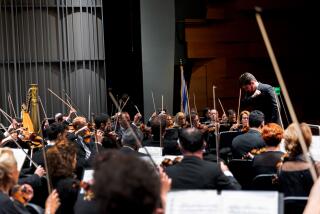A wealth of emotion in one riveting voice
There’s nothing quite like the voice of Salif Keita. It penetrates and envelops, it grates against the nerves while embracing the spirit. It tumbles through melodies like a free-flowing waterfall, it drives the rhythm with the passionate cries and grunts of a force of nature.
No wonder that Keita, born in Mali, has been a world-music star since his 1987 recording, “Soro,” defined a new blend of African and Western elements. Others had tried similar amalgams but none with the success that Keita had, largely because they did not have the crucial element that always was present in his music -- that extraordinary, utterly inimitable voice.
Keita’s vocal abilities were in fine form Saturday at Walt Disney Concert Hall. Drawing largely from his Grammy-nominated 2006 CD, “M’Bemba,” Keita started slowly, his intensity a bit reserved. But by the time he reached his third number, “Laban,” he was in high gear.
That was also the point at which, ironically, the focus shifted from Keita to his ensemble. Like an exotic nightclub show from the ‘40s, the concert became a showcase for differing aspects of African music.
Sekou-Amala Keita, a tall, gangly male dancer, swirled on stage garbed in white robes, turban and mask, arms and legs flying in all directions; he would return several times thereafter, wearing loincloths, occasionally doing choreographed routines with the two female backup singer-dancers. Solo spots also were allocated to half a dozen band members.
Entertaining as the showcase was, enhanced by Keita’s continuing vocals, the concert -- at that point -- lost the dark emotional intensity it had when the spotlight was on the headliner.
Fortunately, it was followed by the evening’s most gripping segment, three songs in which Keita performed alone, accompanied by his own guitar playing. Moving into areas beyond the repetitious patterns of his work with the ensemble, it offered a compelling view of Keita -- an albino African, a direct descendant of Mandingo royalty -- singing material with a musical density and complexity matching the timbres of his remarkable voice.
More to Read
The biggest entertainment stories
Get our big stories about Hollywood, film, television, music, arts, culture and more right in your inbox as soon as they publish.
You may occasionally receive promotional content from the Los Angeles Times.










